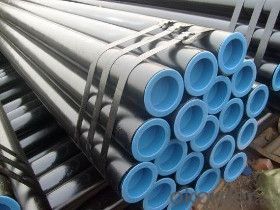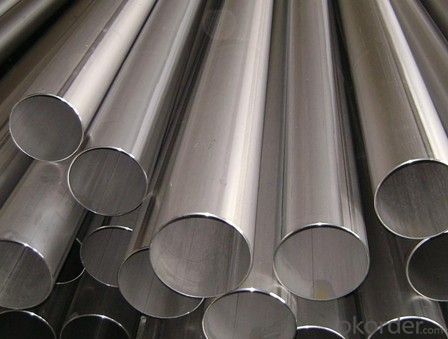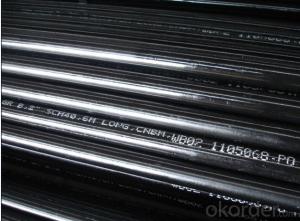Round Seamless Steel Pipe 1/2"
- Loading Port:
- China Main Port
- Payment Terms:
- TT or LC
- Min Order Qty:
- -
- Supply Capability:
- -
OKorder Service Pledge
OKorder Financial Service
You Might Also Like
1、Structure of Seamless Steel Pipe :
Seamless pipe is formed by drawing a solid billet over a piercing rod to create the hollow shell. Historically seamless pipe was regarded as withstanding pressure better than other types, and was often more easily available than welded pipe.
2、Main Features of the Seamless Steel Pipe:
• High manufacturing accuracy
• High strength
• Small inertia resistance
• Strong heat dissipation ability
• Good visual effect
• Reasonable price
3、Seamless Steel Pipe Specification:
Standard | GB, DIN, ASTM ASTM A106-2006, ASTM A53-2007 |
Grade | 10#-45#, 16Mn 10#, 20#, 45#, 16Mn |
Thickness | 8 - 33 mm |
Section Shape | Round |
Outer Diameter | 133 - 219 mm |
Place of Origin | Shandong, China (Mainland) |
Secondary Or Not | Non-secondary |
Application | Hydraulic Pipe |
Technique | Cold Drawn |
Certification | API |
Surface Treatment | factory state or painted black |
Special Pipe | API Pipe |
Alloy Or Not | Non-alloy |
Length | 5-12M |
Outer Diameter | 21.3-610mm |
Grade | 20#, 45#, Q345, API J55, API K55, API L80, API N80, API P110, A53B |
Standard | ASME, ASTM |
4、Packaging & Delivery
Packaging Details: | seaworthy package,bundles wrapped with strong steel strip |
Delivery Detail: | 15-30days after received 30%TT |
5、FAQ of Seamless Steel Pipe :
①How is the quality of your products?
Our products are manufactured strictly according to national and internaional standard, and we take a test
on every pipe before delivered out. If you want see our quality certifications and all kinds of testing report, please just ask us for it.
②How about price?
Yes, we are factory and be able to give you lowest price below market one, and we have a policy that “ for saving time and absolutely honest business attitude, we quote as lowest as possible for any customer, and discount can be given according to quantity”,if you like bargain and factory price is not low enough as you think, just don’t waste your time.Please trust the quotation we would give you, it is professional one.
③Why should you chose us?
Chose happens because of quality, then price, We can give you both.Additionally, we can also offer professional products inquiry, products knowledge train(for agents), smooth goods delivery, exellent customer solution proposals.Our service formula: good quality+good price+good service=customer’s trust
SGS test is available, customer inspection before shipping is welcome, third party inspection is no problem.
Any question, pls feel free to contact us !
6、Seamless Steel Pipe Images:


- Q:How are steel pipes tested for strength and durability?
- Steel pipes are tested for strength and durability through various methods such as hydrostatic testing, non-destructive testing, and mechanical testing. Hydrostatic testing involves pressurizing the pipe with water to check for any leaks or weaknesses. Non-destructive testing techniques like ultrasonic or magnetic particle testing are used to detect any flaws or defects within the pipe. Mechanical testing involves subjecting the pipe to various loads and stresses to assess its performance and resistance to deformation. These tests ensure that steel pipes meet the required standards and are capable of withstanding the intended applications.
- Q:How are steel pipes installed underground?
- Steel pipes are installed underground through a process called trenching, where a trench is dug to the desired depth and length. The steel pipes are then placed in the trench and secured using various techniques such as welding or threading. The trench is then backfilled, ensuring proper compaction around the pipes to provide stability and prevent movement.
- Q:What are the factors to consider when selecting steel pipes?
- Some factors to consider when selecting steel pipes include the intended application and environment, the required strength and durability, the size and thickness of the pipes, the corrosion resistance, the cost, and the availability of different types of steel pipes.
- Q:How are steel pipes insulated for thermal applications?
- Steel pipes are commonly insulated for thermal applications using various materials such as fiberglass, mineral wool, or foam insulation. These insulating materials are typically wrapped around the steel pipes to create a protective barrier that reduces heat transfer. Additionally, a vapor barrier may be installed to prevent moisture condensation. This insulation helps to maintain the desired temperature of the fluid or gas being transported through the pipes and prevents energy loss.
- Q:How are steel pipes tested for quality and strength?
- Steel pipes are tested for quality and strength through various methods such as destructive and non-destructive testing. Destructive testing includes tests like tensile, impact, and hardness tests, which measure the strength and durability of the pipes. Non-destructive testing methods like ultrasonic or X-ray examination are used to detect any defects or flaws in the pipes without causing any damage. These testing methods ensure that steel pipes meet the required quality and strength standards before being used in various applications.
- Q:How are steel pipes protected from corrosion?
- Steel pipes are protected from corrosion through various methods such as applying protective coatings, galvanizing the pipes, or using corrosion inhibitors.
- Q:How are steel pipes protected against underground corrosion?
- Steel pipes are protected against underground corrosion through various methods such as cathodic protection, coatings, and corrosion inhibitors. Cathodic protection involves the use of sacrificial anodes or impressed current systems that direct corrosion away from the steel pipes. Coatings like epoxy or polyethylene are applied to the pipes to create a physical barrier against moisture and corrosive elements in the soil. Additionally, corrosion inhibitors can be added to the fluid inside the pipes to prevent corrosion from occurring.
- Q:Are steel pipes suitable for underground chemical transport?
- Steel pipes are widely regarded as appropriate for transporting chemicals underground because of their high strength and durability. They have the ability to endure the pressure and weight of the soil above, rendering them impervious to harm or collapse. Furthermore, steel pipes possess corrosion resistance, which is vital when conveying chemicals that might react with or corrode other substances. They also have the capability to handle a wide range of temperatures, making them suitable for transporting chemicals that necessitate specific temperature conditions. Nevertheless, it is crucial to carefully consider the particular chemical being transported and seek advice from experts in chemical engineering or pipeline design to guarantee the compatibility of the steel pipes with the chemical and the implementation of any necessary safety precautions.
- Q:What is the difference between steel pipes and PVC-O pipes?
- Steel pipes and PVC-O pipes differ in their composition, strength, and durability. Steel pipes are made from a combination of iron and carbon, making them extremely strong and resistant to high-pressure applications. However, they are susceptible to corrosion and may require regular maintenance. On the other hand, PVC-O pipes are made from a specialized form of polyvinyl chloride, which enhances their strength and durability while being corrosion-resistant. PVC-O pipes are also lighter, easier to install, and have a longer lifespan compared to steel pipes. Overall, while steel pipes excel in strength, PVC-O pipes offer a more cost-effective and durable solution for various plumbing and industrial applications.
- Q:How are steel pipes protected against rusting?
- Corrosion protection is employed to safeguard steel pipes from rusting. Various methods are utilized for preventing the formation of rust on steel pipes, including the following: 1. Coatings: To create a barrier against rust, different coatings are applied to the surface of steel pipes. These coatings prevent oxygen and moisture from reaching the metal surface and initiating the rusting process. Options for coatings include epoxy, polyethylene, zinc, or a combination of these materials. 2. Galvanization: Steel pipes are immersed in a molten zinc bath to undergo galvanization. This process forms a protective layer of zinc on the surface of the pipes, acting as a sacrificial barrier. If any small areas of the pipe surface are exposed, the zinc coating will corrode instead of the steel, providing continuous protection against rust. 3. Cathodic Protection: Electrical current is utilized to safeguard steel pipes in this method. By connecting the pipes to a sacrificial anode, usually made of zinc or magnesium, the anode will corrode instead of the steel pipes when exposed to moisture and oxygen. This method is commonly employed in underground or underwater applications. 4. VCI (Vapor Corrosion Inhibitor) Technology: Chemical compounds are used in VCI technology to release a vapor that protects steel pipes from rusting. These compounds form a thin layer on the surface of the pipes, inhibiting the corrosion process by neutralizing oxygen and moisture. 5. Regular Maintenance: Aside from the aforementioned methods, regular inspection and maintenance play a crucial role in preventing rust formation on steel pipes. This involves cleaning the pipes, removing any accumulated debris or corrosive substances, and repairing any damaged coatings or protective layers. In summary, these corrosion protection methods effectively ensure the longevity and durability of steel pipes in various industrial, commercial, and residential applications by safeguarding them against rusting.
1. Manufacturer Overview |
|
|---|---|
| Location | |
| Year Established | |
| Annual Output Value | |
| Main Markets | |
| Company Certifications | |
2. Manufacturer Certificates |
|
|---|---|
| a) Certification Name | |
| Range | |
| Reference | |
| Validity Period | |
3. Manufacturer Capability |
|
|---|---|
| a)Trade Capacity | |
| Nearest Port | |
| Export Percentage | |
| No.of Employees in Trade Department | |
| Language Spoken: | |
| b)Factory Information | |
| Factory Size: | |
| No. of Production Lines | |
| Contract Manufacturing | |
| Product Price Range | |
Send your message to us
Round Seamless Steel Pipe 1/2"
- Loading Port:
- China Main Port
- Payment Terms:
- TT or LC
- Min Order Qty:
- -
- Supply Capability:
- -
OKorder Service Pledge
OKorder Financial Service
Similar products
New products
Hot products
Hot Searches
Related keywords






























